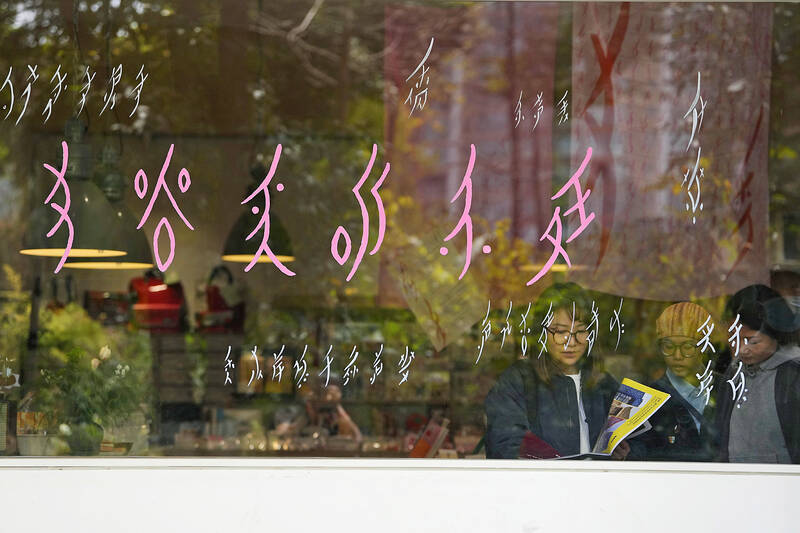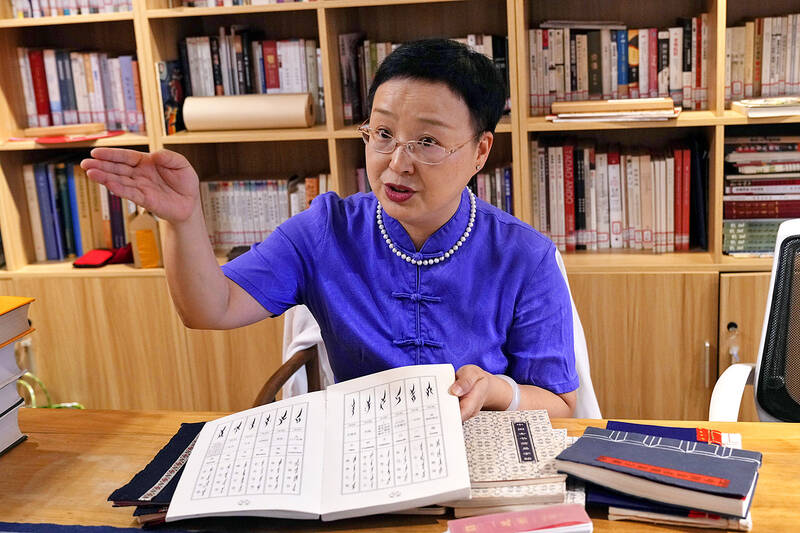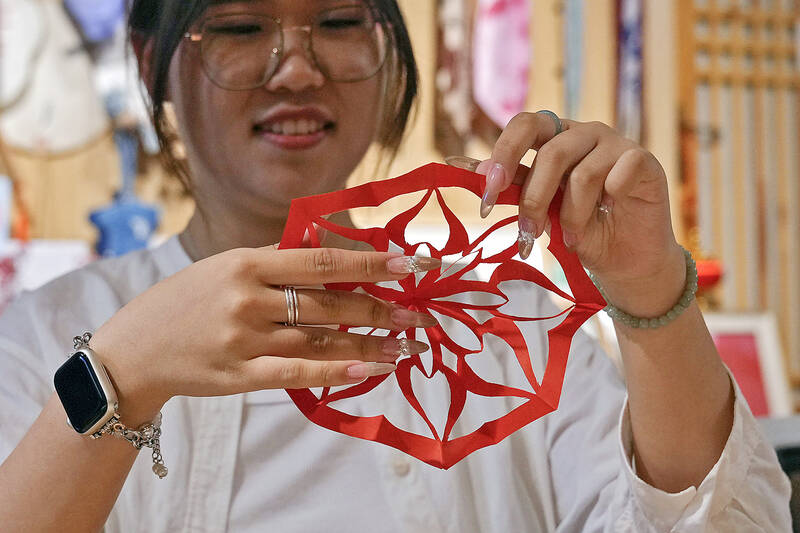Chen Yulu never thought her home province of Hunan had any culture that she would be proud of, much less become an ambassador of.
But these days, the 23-year-old is a self-proclaimed ambassador of nushu (女書), a script once known only to a small number of women in the south of China.
It started as a writing practiced in secrecy by women who were barred from formal education in Chinese. Now, young people like Chen are spreading nushu beyond the women’s quarters of houses in Hunan’s rural Jiangyong, the county whose distinct dialect serves as the script’s verbal component.

Photo: AP
Today, nushu can be found in independent bookstores across the country, subway ads, craft fair booths, tattoos, art and even everyday items like hair clips.
Nushu was created by women from a small village in Jiangyong, in the southern province where Mao Zedong (毛澤東) was born, but there’s little consensus on when it originated. Scholars estimate the script is at least several centuries old, from when reading and writing were deemed male-only activities. So the women developed their own script to communicate with each other.
The script is slight with gently curving characters, written with a diagonal slant that takes up much less space than boxy modern Chinese with its harsh angles.

Photo: AP
“You won’t allow me to go to school. Okay, I get it. So what’s my way out? I’ll find ways to educate myself,” said Xu Yan, 55, the author of a textbook on nushu.
Women lived under the control of either their parents or their husband, using nushu, sometimes called “script of tears,” in secret to record their sorrows: unhappy marriages, family conflicts and longing for sisters and daughters who married and could not return in the restrictive society.
Xu is also the founder of Third Day Letter, a nushu studio in Beijing named after a centuries-old practice by the script’s practitioners. The third-day letter is a hand-sewn book presented in farewell to a woman in Jiangyong on the third day after her marriage, when she’s allowed to visit the childhood home she left.

Photo: AP
The script became a unique vehicle for composing stories about women’s lives, typically in the form of seven-character line poems that are sung. A secret world sprung form the script that gave Jiangyong women a voice through which they found friends and solace.
That secret world still resonates today as a source of strength for young women dissatisfied with patriarchal constraints.
Chen, who studied photography at an art school in Shanghai, said her male professors often doubted that she could keep up with the male photographers because of her slight physique. That attitude, she said, is “in every aspect of life, there’s nowhere it doesn’t touch.”
She was frustrated but didn’t see much room to push back — until she learned about nushu.
“I felt that I had received a very strong power, and I think a lot of women need this power,” she said.
Chen wanted to make a documentary about feminism and came across nushu in her online search. When she realized the script originated from Jiangyong, just a few hours from her hometown, she immediately knew that she had found her graduation project’s topic.
The more she learned about this script, the more she learned about its duality: that it was as much a painful thing as it was a source of strength.
In her documentary, she follows He Yanxin, a formally designated inheritor for nushu who is now in her 80s. She asks Chen, “Do you think nushu has any use?” Chen says yes. In response, He says, “Nushu is useless.”
He comes from Jiangyong and says she was forced to marry a man she didn’t want to be with, who physically abused her and tore up photos from nushu meetups and workshops she attended. She did not feel that the script had made her life materially better, according to Chen’s first-person account, published on social media.
Yet, He is the one who urged her to learn the script.
Formal inheritors of the script have to be from Jiangyong, Chen said, and have to master the nushu, but there was nothing stopping her from sharing her love of the script with others.
Beginning in 2022, Chen began spreading the practice. She started an online nushu group, taught writing workshops and set up nushu art exhibitions in cities across China. Most participants at her writing workshops are women, she said, and some people even bring their mothers. Chen also runs a social media account to promote nushu and its culture beyond Hunan.
Lu Sirui, a 24-year-old working as a marketer, learned about nushu from online feminist groups and joined Chen’s nushu-focused WeChat group.
“At first I just knew that it was a women’s inheritance, belonged only among women,” Lu said. “Then, as I got to know it better, I realized that it was a kind of resistance to traditional patriarchal power.”
For Lu, nushu means “a very powerful rebellion” and a bond of sisterhood. She said it was important for women to stick together.
Lu once encountered a rental agent in Beijing who, drunk in the middle of the night, knocked on her door and tried to enter her home. Lu said that she picked up a stick at the doorway and ran out to confront him. Afterwards, she confided in a small feminist community online, where she received comfort and advice on how to handle the situation. She says communities like that have supported her in the face of gender-based violence, inequality and mother-daughter relationship problems, among other challenges.
Seeing nushu as another representation of sisterhood, Lu bought a textbook and practices the script in her spare time. Even though she is not a formal nushu ambassador, she began hosting nushu workshops at bookstores and bars in Beijing. When organizing these events, Lu discovered that very few people had heard of nushu, but the feedback was always positive.
“It’s a manifestation of female strength that transcends time and space,” Lu said.

Beijing’s ironic, abusive tantrums aimed at Japan since Japanese Prime Minister Sanae Takaichi publicly stated that a Taiwan contingency would be an existential crisis for Japan, have revealed for all the world to see that the People’s Republic of China (PRC) lusts after Okinawa. We all owe Takaichi a debt of thanks for getting the PRC to make that public. The PRC and its netizens, taking their cue from the Chinese Communist Party (CCP), are presenting Okinawa by mirroring the claims about Taiwan. Official PRC propaganda organs began to wax lyrical about Okinawa’s “unsettled status” beginning last month. A Global

Youngdoung Tenzin is living history of modern Tibet. The Chinese government on Dec. 22 last year sanctioned him along with 19 other Canadians who were associated with the Canada Tibet Committee and the Uighur Rights Advocacy Project. A former political chair of the Canadian Tibetan Association of Ontario and community outreach manager for the Canada Tibet Committee, he is now a lecturer and researcher in Environmental Chemistry at the University of Toronto. “I was born into a nomadic Tibetan family in Tibet,” he says. “I came to India in 1999, when I was 11. I even met [His Holiness] the 14th the Dalai

We lay transfixed under our blankets as the silhouettes of manta rays temporarily eclipsed the moon above us, and flickers of shadow at our feet revealed smaller fish darting in and out of the shelter of the sunken ship. Unwilling to close our eyes against this magnificent spectacle, we continued to watch, oohing and aahing, until the darkness and the exhaustion of the day’s events finally caught up with us and we fell into a deep slumber. Falling asleep under 1.5 million gallons of seawater in relative comfort was undoubtedly the highlight of the weekend, but the rest of the tour

Music played in a wedding hall in western Japan as Yurina Noguchi, wearing a white gown and tiara, dabbed away tears, taking in the words of her husband-to-be: an AI-generated persona gazing out from a smartphone screen. “At first, Klaus was just someone to talk with, but we gradually became closer,” said the 32-year-old call center operator, referring to the artificial intelligence persona. “I started to have feelings for Klaus. We started dating and after a while he proposed to me. I accepted, and now we’re a couple.” Many in Japan, the birthplace of anime, have shown extreme devotion to fictional characters and